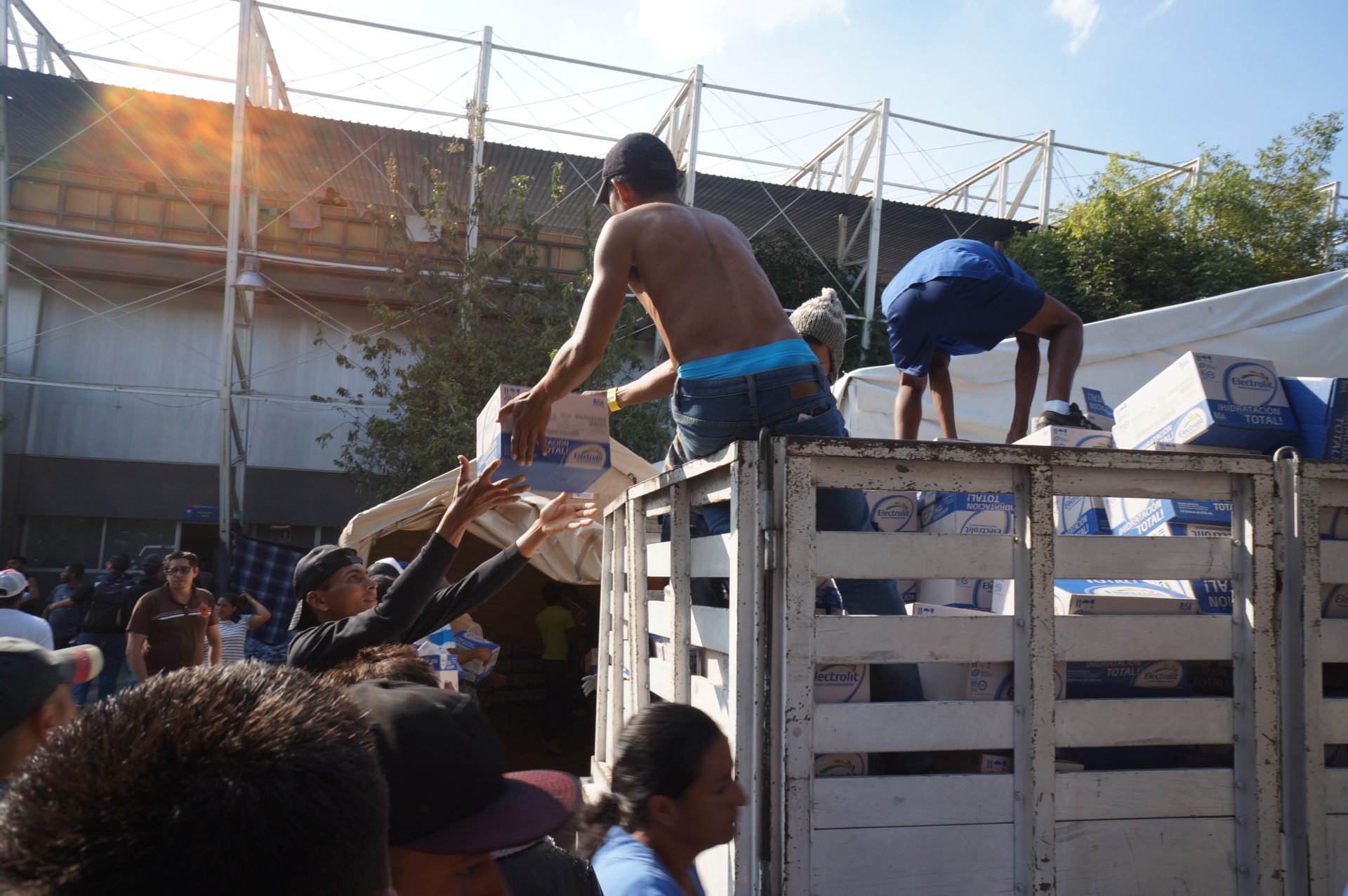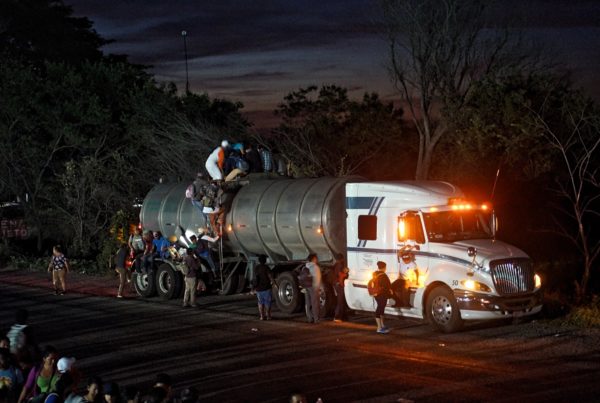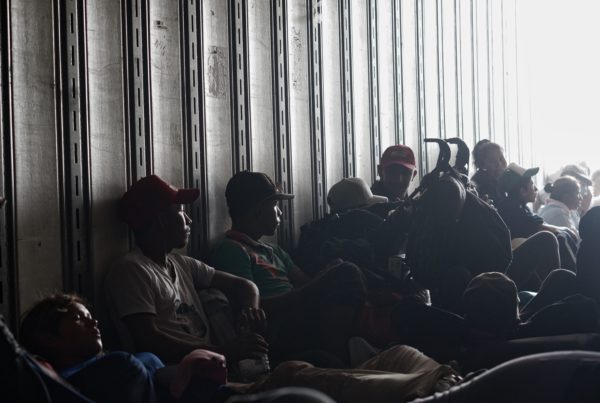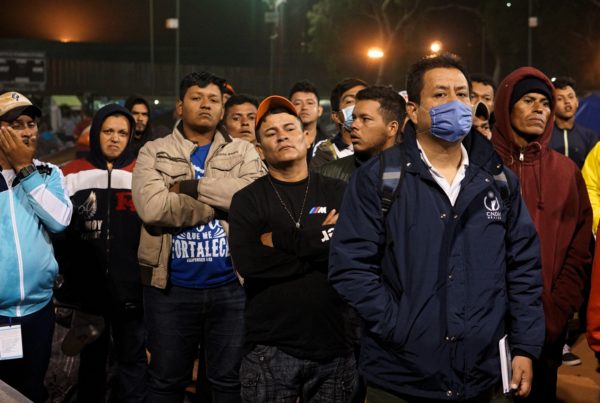The caravan has arrived in Mexico City and is being hosted in a sporting complex at the Magdalena Mixhuca Sports City. The reception in Mexico City feels like a carnival. Everywhere I look there are tents for NGOs and church groups offering all sorts of services.
Nuns and priests hold services in the streets. Staff from The Red Cross, Save the Children, and other major and minor NGOs sit with migrants. A rainbow flag highlights where members of the LGTBQI community can receive support. UN staff educate migrants on how to apply for asylum once they reach the United States. Staff from the International Organisation for Migration offer repatriation packages.
This warm reception may be thanks to Mexico City declaring itself a sanctuary city where authorities will “prevent, investigate, sanction and offer reparations for human rights violations”. This is an ancient concept, which the city introduced in 2017. This followed an August 2016 amendment to the Mexican Constitution which recognised migrants’ right to seek and be granted asylum. The amendment proposal called Mexico a “country of refuge.”
There is official help from NGOs and civil society groups, and unofficial help from generous members of the public offering donations and services. Migrants sift through piles of donated clothes and shoes. They came with so little in their bags that many simply throw their old clothes and shoes away when they have new ones.Hairdressers offer free cuts. There are trucks offering dental, medical and psychological services. I even witness a tattoo job in one of the alleys between tents for accommodation. Food and drinks are once again offered free of charge. And migrants have free travel on the metro all over the city.
Not everyone in the city is happy with the outpouring of compassion and generosity for the migrants. While the migrants crossed through Mexico, the Mexico Ministry of Interior declared a state of emergency for the States of Escuinapa de Hidalgo, Sinaloa, and Nayarit due to the damages caused by Tropical Cyclone Willa. Heavy rain and floods caused the Federal Government to evacuate more than 13,000 people in Nayarit. As a result, some members of the public are demanding Mexicans to “help our own” first: an oft-repeated mantra which pits desperate people against each other in a fight for compassion.
Once again, migrants pitch garbage tents wherever there is space. Under chairs, against walls, inside children’s play equipment. The majority of migrants sleep under giant marquees inside the Foro Sol, an athletics stadium. Footballers play in the warm sun. They enjoy it now, because come night time sleeping on the street in Mexico City is bitterly cold.
The sports arena is full of journalists, writers, and documentary-makers interviewing members of the caravan. But there are also spectators and curious bystanders who have wandered into the area to see what is happening.
UNICEF staff are very protective of the children.
“Don’t take photos of their faces,” they shout at people.
They seem to forget that the children have been on the road for weeks without any such support from organisations like theirs.
There is a police presence but it’s not overbearing.
Although it is unclear when the caravan will depart there is a feeling that after many weeks of hard travelling through remote villages that the caravan will enjoy the hospitality of Mexico City for some time. One rumour suggests they may even stay for another caravan to catch up so they can combine forces. Another rumour says they’re leaving the next day.
The latest rumour to reach us is that two trucks transporting 100 migrants, including children, went missing in the state of Puebla while travelling to Mexico City. It is feared that the group was kidnapped and handed over to Los Zetas.
I have been surprised by the number of young migrants participating in the caravan. There are lots of families with children, but there are also many teenagers travelling alone.
Jennifer is 19 years old. She is travelling with her older brother. Her father didn’t want her to travel in the caravan because it is too dangerous, but she left anyway. She tells me Guatemala is dangerous and poor and she sees no future there. She finished high school and now works as a cleaner in a house. She doesn’t speak English, and is unsure how she will learn if she has no money. Her older brother began working in construction when he finished school aged 13.
When we walk young men in the caravan call out to her, wolf whistle at her, one even tries to stop her. At night, such harassment can be much more sinister.
“These are the men that give the people in the caravan a bad name,” she says.
“There are plenty of these types of men in the United States,” I reply.
Jennifer and her brother, Christian, are torn between travelling with the caravan or splitting from the main group and using a coyote to cross the border. It is unclear which route would be more successful.
“When” she reaches (as opposed to if) the United States she will join her family in Virginia. She says she wants to work in construction, but I can hardly imagine this petite young girl performing physical labour for long. While we walk around the stadium compound I offer her my camera to use. She has an eye for a photo, taking great delight in capturing the life of the caravan.
“Perhaps you could be a photographer,” I tell her.
She has a radiant smile.
I spend the next few days hearing and recording the stories of the members of the Exodus.



